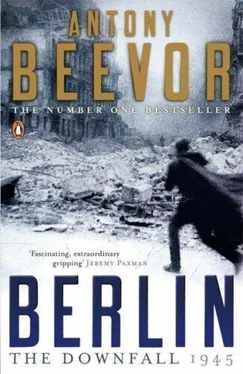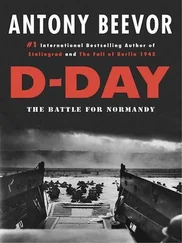Some people had their own reasons for refusing to take shelter during a bombing raid. A married man who used to visit his mistress regularly in the district of Prenzlauerberg could not go down to the communal cellar because that would have aroused suspicions. One evening, the building received a direct hit, and the luckless adulterer, who had been sitting on a sofa, was buried up to his neck in rubble. After the raid, a boy called Erich Schmidtke and a Czech labourer whose illegal presence in the cellar had been tolerated heard his screams of pain and ran upstairs towards the sound. After he had been dug out and carried off for treatment, the fourteen-year-old Erich then had to go to tell the injured man’s wife that her husband had been badly injured in this other woman’s flat. She started screaming in anger. The fact that he had been with this woman agitated her far more than his fate. Children in those times received a harsh introduction to the realities of the adult world.
General Günther Blumentritt, like most of those in authority, was convinced that the bombing raids on Germany produced a real ‘Volksgenossenschaff or ‘patriotic comradeship’. This may well have been true in 1942 and 1943, but by late 1944 the effect tended to polarize opinion between the hardliners and the war-weary. Berlin had been the city with the highest proportion of opponents to the Nazi regime, as its voting records before 1933 indicate. But with the exception of a very small and courageous minority, opposition to the Nazis had generally been limited to gibes and grumbles. The majority had been genuinely horrified by the assassination attempt against Hitler on 20 July 1944. And as the Reich’s frontiers became threatened both in the east and in the west, they drank in Goebbels’s stream of lies that the Führer would unleash new ‘wonder weapons’ against their enemies, as if he were about to assume the role of a wrathful Jupiter flinging thunderbolts as a symbol of his power.
A letter written by a wife to her husband in a French prison camp reveals the embattled mentality and the readiness to believe the regime’s propaganda. ‘I have such faith in our destiny,’ she wrote, ‘that nothing can shake a confidence which is born from our long history, from our glorious past, as Dr Goebbels says. It’s impossible that things turn out differently. We may have reached a very low point at this moment, but we have men who are decisive. The whole country is ready to march, weapons in hand. We have secret weapons which will be used at the chosen moment, and we have above all a Führer whom we can follow with our eyes closed. Don’t allow yourself to be beaten down, you must not at any price.’
The Ardennes offensive, launched on 16 December 1944, intoxicated Hitler loyalists with revived morale. The tables had at last turned. Belief in the Führer and in the Wunderwaffen, the miracle weapons such as the V-2, blinded them to reality. Rumours spread that the US First Army had been completely surrounded and taken prisoner due to an anaesthetic gas. They thought that they could hold the world to ransom and take revenge for all that Germany had suffered. Veteran ΝCOs appear to have been among the most embittered. Paris was about to be recaptured, they told each other with fierce glee. Many regretted that the French capital should have been spared from destruction the year before while Berlin was bombed to ruins. They exulted at the idea that history might now be corrected.
The German Army’s high command did not share this enthusiasm for the offensive in the west. General staff officers feared that Hitler’s strategic coup against the Americans in the Ardennes would weaken the Eastern Front at a decisive moment. The plan was in any case vastly over-ambitious. The operation was spearheaded by the Sixth SS Panzer Army of Oberstgruppenführer Sepp Dietrich and the Fifth Panzer Army of General Hasso von Manteuffel. Yet the lack of fuel made it extremely unlikely that they would ever reach their objective of Antwerp, the Western Allies’ main supply base.
Hitler was fixated by dreams of dramatically reversing the fortunes of war and forcing Roosevelt and Churchill to come to terms. He had decisively rejected any suggestion of overtures to the Soviet Union, partly for the sound reason that Stalin was interested only in the destruction of Nazi Germany, but there was also a fundamental impediment. Hitler suffered from an atrocious personal vanity. He could not be seen to sue for peace when Germany was losing. A victory in the Ardennes was therefore vital for every reason. But American doggedness in defence, especially at Bastogne, and the massive deployment of Allied air power once the weather cleared, broke the momentum of attack within a week.
On Christmas Eve, General Heinz Guderian, the chief of the army supreme command, OKH, drove in his large Mercedes staff car to Führer headquarters in the west. After abandoning the Wolfsschanze, or ‘Wolf’s Lair’, in East Prussia on 20 November 1944, Hitler had moved to Berlin for a minor operation on his throat. He had then left the capital on the evening of 10 December in his personal armoured train. His destination was another secret and camouflaged complex in woods near Ziegenberg, less than forty kilometres from Frankfurt am Main. Designated the Adlerhorst, or ‘Eagle’s Eyrie’, it was the last of his field headquarters to be known by codenames which reeked of puerile fantasy.
Guderian, the great theorist of tank warfare, had known the dangers of such an operation from the start, but he had little say in the matter. Although the OKH was responsible for the Eastern Front it was never allowed a free hand. The OKW, the high command of the Wehrmacht (all the armed forces), was responsible for operations outside the Eastern Front. Both organizations were based just south of Berlin in neighbouring underground complexes at Zossen.
Despite having as quick a temper as Hitler, Guderian was very different in outlook. He had little time for an entirely speculative international strategy when the country was under attack from both sides. Instead, he relied on a soldier’s instinct for the point of maximum danger. There was no doubt where that lay. His briefcase contained the intelligence analysis of General Reinhard Gehlen, the head of Fremde Heere Ost, the military intelligence department for the Eastern Front. Gehlen calculated that around 12 January the Red Army would launch a massive attack from the line of the River Vistula. His department estimated that the enemy had a superiority of eleven to one in infantry, seven to one in tanks and twenty to one in artillery and also in aviation.
Guderian entered the conference room at the Adlerhorst to find himself facing Hitler and his military staff, and also Heinrich Himmler, the Reichsführer SS who, after the July plot, had also been made commander of the Replacement Army. Every member of Hitler’s military staff had been selected for his unquestioning loyalty. Field Marshal Keitel, the chief of staff of the OKW, was famous for his pompous servility to Hitler. Exasperated army officers referred to him either as the ‘Reich’s garage attendant’ or the ‘nodding donkey’. Colonel General Jodl, who had a cold, hard face, was far more competent than Keitel, yet he hardly ever opposed the Führer’s disastrous attempts to control every battalion. He had very nearly been dismissed in the autumn of 1942 for having dared to contradict his master. General Burgdorf, Hitler’s chief military adjutant and chief of the army personnel department controlling all appointments, had replaced the devoted General Schmundt, mortally wounded by Stauffenberg’s bomb at the Wolfsschanze. Burgdorf was the man who had delivered the poison to Field Marshal Rommel, with the ultimatum to commit suicide.
Читать дальше











